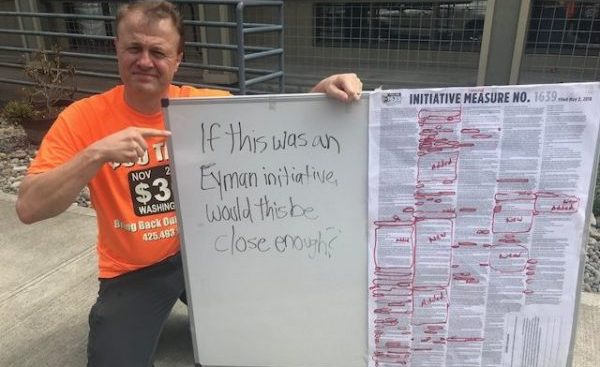
Washington Secretary of State (SOS) Kim Wyman’s office last Friday acknowledged that “significant concerns have been raised about whether the format of the Initiative 1639 petition sheets complies fully with Washington’s constitutional and statutory requirements.”
Coupled with an editorial in the Walla Walla Union Bulletin that suggested the measure needs scrutiny, the SOS acknowledgement helps raise concerns about the gun control initiative, sponsored by the Seattle-based Alliance for Gun Responsibility. When petitions were turned in at the SOS offices in Olympia last week, Evergreen State initiative guru Tim Eyman was there with a supersized copy of the I-1639 petition and marked in red all the apparent violations of law.
Regardless of one’s opinion of Eyman – he is sometimes dismissed as an annoying political gadfly by people opposed to his tax reduction crusade – he can be considered an expert on public initiatives, having pushed several ballot measures over the past 20 years that have consistently faced all manner of legal and technical challenges.
“Significant concerns have been raised about whether the format of the I-1639 petition sheets complies fully with Washington’s constitutional and statutory requirements.” —News Release from Secretary of State Kim Wyman
An editorial in the Everett Herald argues in favor of accepting the initiative, but one issue has been raised in the debate over this gun control effort. Would anyone support such an initiative, with the concerns that have been raised, if Eyman was behind it? KVI’s John Carlson last Friday dubbed it “the Eyman standard.”
Eyman’s initiatives historically have challenged taxes, and he’s not popular in Olympia, Seattle and other liberal enclaves, nor with many editorial boards. His initiatives are opposed by liberals almost out of reflex.
The issues over I-1639 aren’t about Eyman, and yet they are. Should I-1639 get the same scrutiny as an Eyman measure?
A state Supreme Court commissioner last week passed the buck to Wyman on whether to accept the petitions. Wyman says state law prevents her from rejecting the petitions except on very specific grounds, and the Union Bulletin editorial said Wyman should “rule on a strict interpretation of the law.”
“If she determines the petition was not written exactly as the law specifies,” the newspaper said, “she should reject the petitions to put I-1639 on the ballot. And those who disagree with her ruling can take the matter to court.”
“RCW 29A.72.100 requires that a ‘readable, full, true, and correct’ copy of the proposed measure be printed on the reverse side of the petition. The I-1639 petition sheets presented a text of the measure that lacked underlining and strikethroughs to explain its changes to existing law.”—News Release from Secretary of State Kim Wyman
In an essay at WeTheGoverned.com, Glen Morgan, a plaintiff in a lawsuit that sought to enjoin Wyman from accepting the petitions, makes a compelling argument against the measure, as presented on the initiative forms. There are no underlines designating new language that would be added to state law, and no strike-outs (lines across words) that show what statutory language would be removed. The typeface is so small that the measure, as presented, was unreadable by many who complained to the Second Amendment Foundation and Citizens Committee for the Right to Keep and Bear Arms, both of which supported Morgan’s court effort.
As the statement from Wyman’s office noted, the law “requires that a ‘readable, full, true, and correct’ copy of the proposed measure be printed on the reverse side of the petition.” According to Morgan and other critics, including SAF founder and Executive Vice President Alan Gottlieb, that is not the case.
Over the weekend, there was a fair amount of discussion among Evergreen State Second Amendment activists regarding the initiative. If they can turn their activism into a movement, gun prohibitionists backing the initiative with fat wallets and piles of cash will literally get a “run for their money.”
“However, the Legislature has limited the authority of the Secretary of State regarding this topic…State law does not provide the Secretary of State authority to reject petition sheets based on the requirements in RCW 29A.72.100, which addresses what must be printed on the back of the petition.” —News Release from Secretary of State Kim Wyman
Perhaps the key to this discussion is found in a remark from former Secretary of State Sam Reed, initially quoted by the Tacoma News Tribune and again in the Walla Walla editorial. Noting that he could not recall the issue of editing coming up in the past regarding a citizen initiative, Reed observed via email, “It would be totally unacceptable for the Legislature to vote on proposed legislation without the strike-outs and underlines. Since the public is acting as the Legislature with initiatives, they need to meet up to the same standards.”
If I-1639 isn’t held to the legal standard, opponents contend, then what? What does this mean to sponsors of other initiatives, including Eyman, who have their measures challenged?
